- Home
- Dante Alighieri
Circles of Hell Page 3
Circles of Hell Read online
Page 3
We (as shall all), come Judgement Day, shall seek
our cast-off spoil, yet not put on this vestment.
Keeping what we tore off would not be fair.
Our bodies we shall drag back here; and all
around this melancholy grove they’ll swing,
each on the thorn of shades that wrought them harm.’
Attention trained entirely on that stock
(thinking, in truth, it might as yet say more),
we now were shocked by a sudden uproar,
as if (to make comparison) you’d heard some hog
and all the boar hunt baying round its stand –
a sound composed of beasts and thrashing twigs.
And look there, on the left-hand side, there came,
at speed, two fleeing, naked, scratched to bits,
who broke down every hurdle in that scrub.
One was ahead: ‘Quick, quick! Come, death! Come now!’
The other (seeming, to himself, too slow)
was yelling: ‘Lano! Oh, your nimble heels
weren’t half so sharp at the Toppo rumble!’
And then (it may be his breath was failing),
he sank to form a clump beside a shrub.
Behind these two, the wood was teeming, full
of black bitches, ravenous and rapid,
as greyhounds are when slipping from their leads.
These set their teeth on that sad, hunkered form.
They tore him all to pieces, chunk by chunk.
And then they carried off those suffering limbs.
My guide then took me gently by the hand,
and led me to the bush, which wept (in vain)
through all of its blood-stained lacerations,
saying: ‘O Jacopo da Santo Andrea!
What use was it to take me as your shield?
Am I to blame for your wild, wicked ways?’
My teacher came and stood above that bush.
‘So who were you,’ he said, ‘who, pierced to bits,
breathes painful utterance in jets of blood?’
‘You souls,’ he said, ‘you come – but just in time –
to see the massacre, in all its shame,
that rends away from me my fresh green fronds.
Place all these leaves beneath this grieving stump.
I too was from that city, once, which chose
Saint John as patron over Mars – its first –
whose arts, since spurned, have always brought us harm.
And were there not, beneath the Arno bridge,
some traces visible of what he was,
those citizens who built it all anew
on ashes that Attila left behind
would then have laboured with no end in view.
Myself, I made a gallows of my house.’
Canto XVII
PASSAGE TO THE EIGHTH CIRCLE
‘Behold! The beast who soars with needle tail
through mountains, shattering shields and city walls!
Behold! The beast that stinks out all the world!’
To me, my lord spoke thus, then beckoned up
the monster to approach the jutting prow
that marked the end of all our marble paths.
It came, that filthy image of deceit.
Its head and trunk it grounded on the shore.
It did not draw its tailpiece to the bank.
The face was that of any honest man,
the outer skin all generosity.
Its timber, though, was serpent through and through:
two clawing grabs, and hairy to the armpits,
its back and breast and ribcage all tattooed
with knot designs and spinning little whorls.
No Turk or Tartar has woven finer drapes,
more many-coloured in their pile or tuft.
Nor did Arachne thread such tapestries.
Compare: on foreshores, sometimes, dinghies stand
in water partly, partly on the shingle –
as likewise, in the land of drunken Germans,
beavers will do, advancing their attack.
So did this beast – the worst that there can be –
there on the rocky rim that locks the sand.
Out into emptiness it swung its tail,
and twisted upwards its venomous fork.
The tip was armed like any scorpion’s.
My leader said: ‘We need to bend our path
a little further down, towards that vile
monstrosity that’s lolling underneath.’
So down we went, towards the right-hand pap.
Ten paces, and we’d reached the very edge,
stepping well clear of flames and burning shoals.
And then, on getting to that spot, I saw,
a little further on along the sandbar,
a group just sitting near the gaping waste.
And here my teacher said: ‘To carry back
experience of the ring that we’re now in,
go over there and look at their behaviour.
But do not stay to talk at any length.
Till you return, I’ll parley with this thing,
for him to grant us use of his great thews.’
So once again, along the outward brow
of Circle Seven I progressed alone
to where there sat these souls in misery.
The pain they felt erupted from their eyes.
All up and down and round about, their hands
sought remedies for burning air and ground.
Dogs in the heat of summer do the same,
stung by the bluebottle, gadfly and flea,
swatting at swarms with paw pads or with snout.
On some of these – these faces under showers
of grievous, never-ceasing rain – I set my eyes.
I recognized no single one, but noticed
round the neck of each a cash bag hung
(each with its own insignia and blaze),
on which their staring eyes appeared to graze.
So I, too, gazing, passed among them all,
and saw, imprinted on a yellow purse,
a blue device, in face and pose a lion.
Then, as my view went trundling further on,
I saw another, with a blood-red field –
the goose it bore was whiter, far, than butter.
And then I heard (from one whose neat, white sack
was marked in azure with a pregnant sow):
‘What are you after in this awful hole?
Do go away! Yet you – as Vitaliano is –
are still alive. Then understand me, please:
he’ll sit on my left flank, my one-time neighbour.
I’m Paduan, among these Florentines,
and often they all thunder in my ears:
“Oh, let him come,” they’ll scream, “that sovereign knight,
who’ll bring the bag that bears three rampant goats.” ’
At which, in throes, he wrenched his mouth awry
and curled his tongue, like any ox, to lick his nose.
And I, who feared that, if I lingered long,
I’d irritate the one who’d said ‘Be brief’,
now turned my back upon these worn-out souls.
My leader, I discovered there, had jumped
already on that fearsome creature’s rump.
‘Come on,’ he urged, ‘be stalwart and courageous.
From now on we’ll descend by stairs like these.
Mount at the front so I can come between,
to see the tail won’t bring you any harm.’
Like someone shivering as the grip of ’flu
spreads over him, pale to the fingernails,
who trembles merely at the sight of shade …
well, that was me, as these words carried over.
The threat of shame, however, when one’s lord
is near, emboldens one to serve him well.
/>
I settled down between those gruesome shoulders.
I wished to say (my voice, though, would not come):
‘Yes. Please! Be sure you hold me very firm.’
He, who in many an earlier ‘perhaps’
had aided me, as soon as I got on,
flinging his arms around me, hugged me tight,
and said: ‘Go on, then, Geryon. Cast out!
Wheel wide about to make a smooth descent.
Think of the strange new burden on your back.’
Slowly astern, astern, as ferries leave
the quay where they had docked, so he moved out.
Then, only when he felt himself ride free,
he turned the tail where breast had been before,
and – stretching long, as eels might do – set sail,
paddling the air towards him with his paws.
No greater fear (so, truly, I believe)
was felt as Phaeton let the reins go loose,
and scorched the sky as still it is today,
nor yet by ill-starred Icarus – his loins
unfeathering as the wax grew warm – to whom
his father screamed aloud: ‘You’re going wrong!’
And then with fear I saw, on every side,
that I was now in air, and every sight
extinguished, save my view of that great beast.
So swimming slowly, it goes on its way.
It wheels. It descends. This I don’t notice –
except an upward breeze now fans my face.
By then I heard, beneath us to the right,
the roar of some appalling cataract.
And so I leant my head out, looking down.
More timorous of falling still, I saw
that there were fires down there and heard shrill screams.
Trembling, I huddled back and locked my thighs.
And then I saw, as I had not before,
the going-down – the spirals of great harm –
on every side now coming ever nearer.
A falcon, having long been on the wing,
and seeing neither lure nor bird to prey on,
compels the falconer to sigh: ‘You’re coming in,’
then sinks down wearily to where it left so fast.
A hundred turns – and then, far from its lord,
it lands, disdainful, spiteful in its scorn.
So, too, did Geryon, to place us on the floor,
the very foot of that sheer, towering cliff.
And then, unburdened of our persons now,
vanished at speed like barbed bolt from a bow.
Canto XIX
SIMONISTS
You! Magic Simon, and your sorry school!
Things that are God’s own – things that, truly, are
the brides of goodness – lusting cruelly
after gold and silver, you turn them all to whores.
The trumpet now (and rightly!) sounds for you.
There you all are, well set in Pocket Three.
Onwards towards this yawning tomb, mounting
the ridge, by now we’d reached its summit –
the point that plumbs the middle of the ditch.
O wisdom in the height, how great the art
that you display in Heaven, on earth and even
in that evil world! How justly you deal power!
I saw how all the livid rock was drilled
with holes – along its flanks, across its floor –
all circular, and all of equal measure.
To me they seemed, in radius, no more nor less
than fonts that, in my own beloved Saint John’s,
allow the priest at baptisms a place to stand.
(Not long ago, I shattered one of those.
Someone was drowning there. I got them out.
This, sealed and sworn, is nothing but the truth.)
Out of the mouth of every single hole
there floated up a pair of sinner feet,
legs to the ham on show, the rest concealed.
The soles of all these feet were set alight,
and each pair wriggled at the joint so hard
they’d easily have ripped a rope or lanyard.
As flames go flickering round some greasy thing
and hover just above its outer rind,
so these flames also, toe tip to heel end.
‘Who, sir,’ I said, ‘is that one there? That one
who jerks in pain greater than his confrères,
sucked at by flames far more fiercely vermilion.’
‘I’ll lift you down,’ he answered me, ‘if you
insist. We’ll take that bank the easier.
He’ll talk to you himself about his twists.’
‘Whatever pleases you,’ I said, ‘to me is good.
Lord, you remain: I’ll not depart – you know –
from what you will. You read my silent thoughts.’
So on we went to the fourth embankment.
We turned around, descended on our left,
arriving at that pitted, straitened floor.
My teacher, kindly, did not set me down –
nor loose me from his hip hold – till we had reached
that fissure where (all tears) shanks shuddered.
‘Whatever you might be there, upside down,
staked, you unhappy spirit, like a pole,
if you,’ I said, ‘are able, then speak out.’
So there I stood like any friar who shrives
the hired assassin – head down in the earth –
who calls him back to put off stifling death.
And he yelled out: ‘Is that you standing there?
Are you there, on your feet still, Boniface?
The writings lied to me by quite some years.
Are you so sick of owning things already?
Till now, you’ve hardly been afraid to cheat
our lovely woman, tearing her to shreds.’
Well, I just stood there (you will know just how)
simply not getting what I’d heard come out,
feeling a fool, uncertain what to say.
Then Virgil entered: ‘Say this – and make speed:
“No, that’s not me. I am not who you think.” ’
And so I answered as he’d said I should.
At which – all feet – the spirit thrashed about,
then, sighing loudly in a tearful voice:
‘So what is it you want of me?’ he said.
‘If you’re so keen to know who I might be,
and ran all down that slope to find me out,
you’d better know I wore the papal cope.
A true Orsini, son of Ursa Bear,
I showed such greed in favouring her brats
that – up there well in pocket – I’m in pocket here.
Below me, in great stacks beneath my head,
packed tight in every cranny of the rock,
are all my antecedents in the Simon line.
Down there I’ll sink, in that same way, when he
arrives whom I supposed that you might be,
and uttered, therefore, my abrupt inquiry.
But I already – feet up on the grill, tossed
upside down – have passed more time
than Boniface will, stuck here with red hot toes.
For after him from westwards there’ll appear
that lawless shepherd, uglier in deed,
who then, for both of us, will form a lid.
He shall be known as a “Jason-Once-Again”.
We read in Maccabees: “Priest Bribes a King.”
This other will score well with one French prince.’
I may have been plain mad. I do not know.
But now, in measured verse, I sang these words:
‘Tell me, I pray: what riches did Our Lord
demand, as first instalment, from Saint Peter
before He placed the keys in his command?
> He asked (be sure) no more than: “Come behind me.”
Nor did Saint Peter, or the rest of them,
receive from Matthias a gold or silver piece,
allotting him the place that Judas lost.
So you stay put. You merit punishment.
But keep your eye on that ill-gotten coin
that made you bold with Charles the Angevin.
And, were I not forbidden, as I am,
by reverence for those keys, supreme and holy,
that you hung on to in the happy life,
I now would bring still weightier words to bear.
You and your greed bring misery to the world,
trampling the good and raising up the wicked.
Saint John took heed of shepherds such as you.
He saw revealed that She-above-the-Waves,
whoring it up with Rulers of the earth,
she who in truth was born with seven heads
and fed herself, in truth, from ten pure horns,
as long as she in virtue pleased her man.
Silver and gold you have made your god. And what’s
the odds – you and some idol-worshipper?
He prays to one, you to a gilded hundred.
What harm you mothered, Emperor Constantine!
Not your conversion but the dowry he –
that first rich Papa – thus obtained from you!’
And all the time I chanted out these notes,
he, in his wrath or bitten by remorse,
flapped, with great force, the flat of both his feet.
My leader, I believe, was very pleased.
In listening to these sounding words of truth,
he stood there satisfied, his lips compressed.
So, too, he took me up in his embrace.
Then, bodily, he clasped me to his breast
and climbed again the path where he’d come down.
Nor did he tire of holding me so tight.
He bore me to the summit of that arch
spanning the banks of Pockets Four and Five.
And there he gently put his burden down,
gently on rocks so craggy and so steep
they might have seemed to goats too hard to cross.
From there, another valley was disclosed.
Canto XXIV
THIEVES
In that still baby-boyish time of year,
when sunlight chills its curls beneath Aquarius,
when nights grow shorter equalling the day,
and hoar frost writes fair copies on the ground
to mimic in design its snowy sister
(its pen, though, not chill-tempered to endure),
the peasant in this season, when supplies
run short, rolls from his bed, looks out and sees

 Circles of Hell
Circles of Hell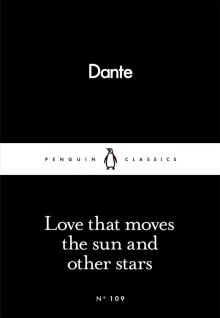 Love That Moves the Sun and Other Stars
Love That Moves the Sun and Other Stars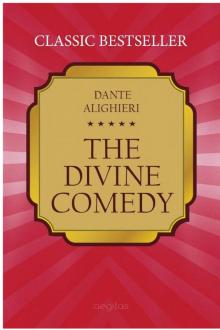 The Divine Comedy
The Divine Comedy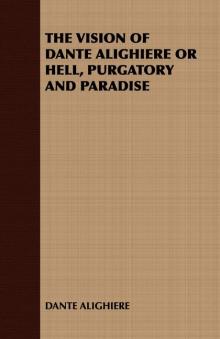 The Vision of Dante Alighiere or Hell, Purgatory and Paradise
The Vision of Dante Alighiere or Hell, Purgatory and Paradise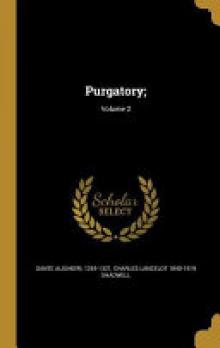 Purgatory
Purgatory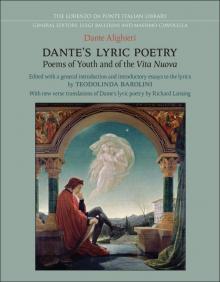 Dante's Lyric Poems (Italian Poetry in Translation)
Dante's Lyric Poems (Italian Poetry in Translation)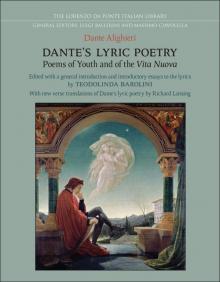 Dante's Lyric Poetry: Poems of Youth and of the 'Vita Nuova'
Dante's Lyric Poetry: Poems of Youth and of the 'Vita Nuova'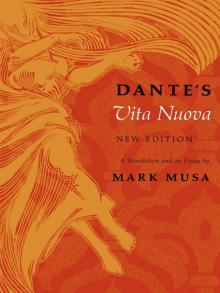 Dante’s Vita Nuova, New Edition: A Translation and an Essay
Dante’s Vita Nuova, New Edition: A Translation and an Essay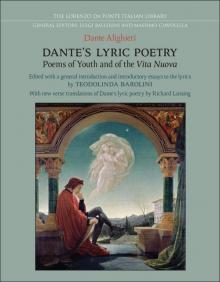 Dante's Lyric Poetry
Dante's Lyric Poetry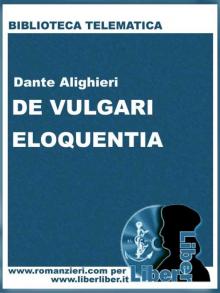 De vulgari eloquentia
De vulgari eloquentia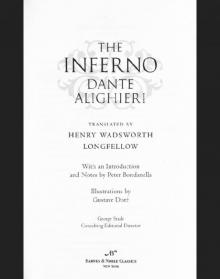 The Inferno (Barnes & Noble Classics Series)
The Inferno (Barnes & Noble Classics Series)